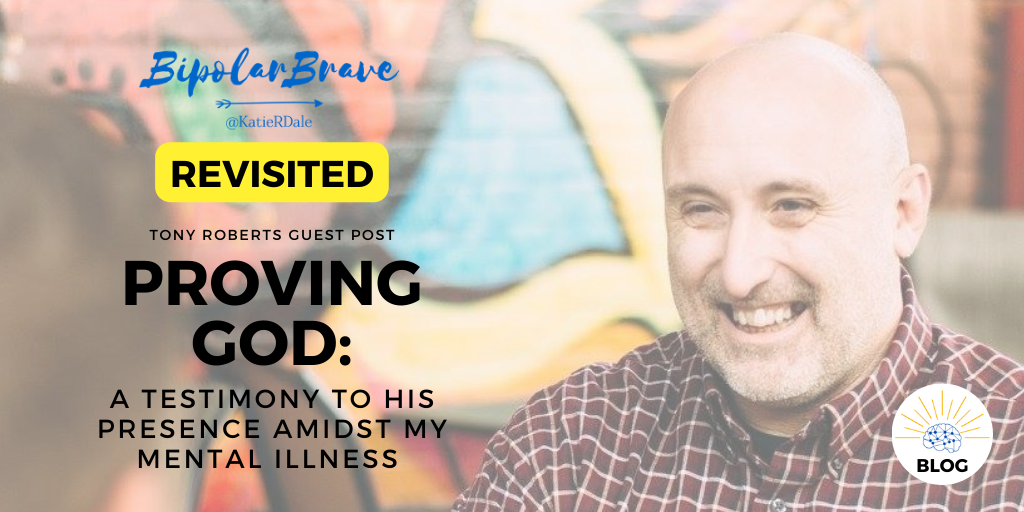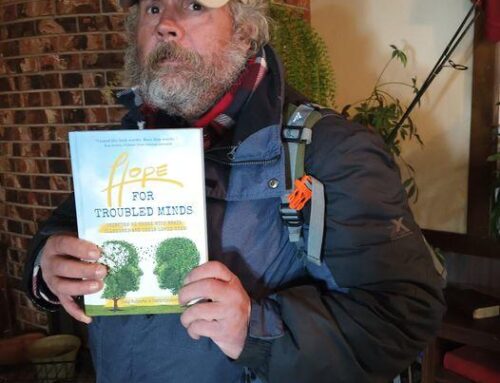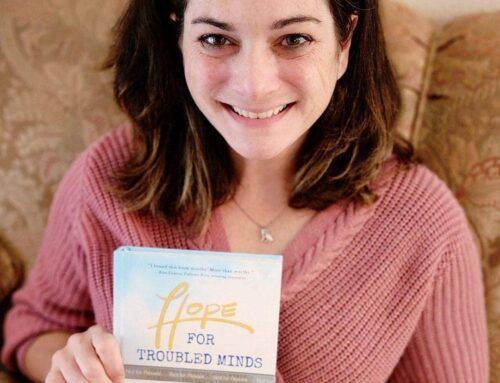A while back, I met Tony Roberts in the circles of online mental health advocacy. Funny, but I don’t know exactly how. I suppose I’ll have to ask him. After meeting virtually and guesting on his and Eric Riddle’s podcast, we collaborated by guest posting on each other’s blogs. With Tony taking a sabbatical and me filling in at the moment, I revisited the guest post he contributed on my BipolarBrave blog six years ago.
Today I want to contribute to the Delight in Disorder blog with Tony’s words from that post in 2018. I hope you are reminded of Tony’s grit, his unwavering faith, and the One who has continued to care for Tony and those of us clinging to the thread of our Savior’s garment.
Katie’s Note: Tony and I collaborated to guest post on one another’s blogs. Check out my guest post The Secret To Finding Sanity After a Mental Episode on Tony’s blog, DelightinDisorder.org.
I entered pastoral ministry in January, 1991. In March, 1995 I was diagnosed with bipolar disorder. By God’s grace, and with the help of many faithful friends, family, and church leaders, I continued to serve another 13 years. This brings me to March of 2008, when the events described in these devotions occur.
Even Me
But you, God, see the trouble of the afflicted;
You consider their grief and take it in hand,
The victims commit themselves to you;
You are the helper of the fatherless. (Psalm 10:14)
I learned as I grew up the importance of being in a personal relationship with Jesus Christ. I was taught to nurture this relationship through daily prayer and Bible study, weekly worship, and regular fellowship with Christians of like-mind. In spite of this upbringing, I often pulled away, turning inward in times of trouble, becoming reclusive when my feelings and beliefs didn’t line up. I believed I was made to praise God with my whole heart, mind, and being. Yet, my feelings were far from God, and I instead obsessed about all that was wrong with me and with the world.
Over the past decade, I’ve often wondered how I could be in a personal relationship with the Lord and still have tried to take my life. Attempting suicide, while often prompted by diseased minds like mine, is an ultimate act of ingratitude for the life God has given us. Yet, after my attempt, I felt drawn closer to God than ever before. Perhaps out of desperation. More likely out of desire.
In my life, there have been plenty of times I’ve felt like giving up on God, but God has never given up on me. I don’t always feel secure in my salvation, but I do know the power of Christ’s saving love first-hand. God brought me back from the dead. In Christ, I have hope for abundant life with him now and forever.
The Psalmists show us that those who look to the LORD for salvation experience how intimately God is connected to us. God sees our troubles even before they are concerns. God knows our grief and grieves with us. When we feel the most helpless, we can turn to God as our loving Father and be swept up in His warm embrace.
When I came to my senses in the hospital bed after my suicide attempt, I had to face the reality that I had tried to abandon God. At the same time, I had discovered God did not abandon me. I say this in no way to brag about my standing with God. I say this instead with tremendous gratitude and wonder that God would take notice of me – even me.
Where Is He?
Why, LORD, do you stand far off?
Why do you hide yourself in times of trouble? (Psalm 10:1)
When people on a psychiatric unit find out one of their own is a pastor, their behavior tends to change. Some clean up their language a good bit while others go out of their way to say something shocking. Some try to trip you up with trivial theological minutia while others seek you out as a spiritual guru.
I’ll never forget the reception I once received from a young man named “Daniel” when he found out I was a pastor. Daniel was tatted and pierced up and wore a constant smirk like a 21st century James Dean. He glared at the nurses when they tried to give him his meds, a laser-sharp stare I thought might soon burn a hole through the Dixie cups.
One night he walked straight up to me and said,
“Where is he?”
“Where is who?” I asked.
“God. Where is God?”
I paused and tried to determine if he was serious. Or if I was going to suffer his burning gaze. He must have read my thoughts.
“I’m not trying to be a jerk. I really want to know. Is God somewhere in your life?”
Daniel’s look softened as I shared how God was with me when my wife found my body on the floor – dead weight from my attempted overdose. And God was with the psychiatrist who coached her through my admission to the hospital. And God was with the therapists and even other patients like him who were helping me get back on my feet and feel like living again.
Daniel smiled.
“Thanks,” he said, “I knew He was out there somewhere.”
 These devotions and 88 others can be found in my spiritual memoir, Delight in Disorder: Ministry, Madness, Mission (available at Amazon). For recent reflections of faith and mental illness, subscribe to my blog at delightindisorder.org
These devotions and 88 others can be found in my spiritual memoir, Delight in Disorder: Ministry, Madness, Mission (available at Amazon). For recent reflections of faith and mental illness, subscribe to my blog at delightindisorder.org
In March, 2018, Eric Riddle and I are co-hosting a bi-weekly podcast called “Revealing Voices: raising unanswered questions; sharing unanswered prayers.” We are a faith-based, peer-led, story-driven, stigma-breaking mental health podcast available on iTunes, other podcast outlets and our website: revealingvoices.com
Discover more from Delight in Disorder
Subscribe to get the latest posts sent to your email.







